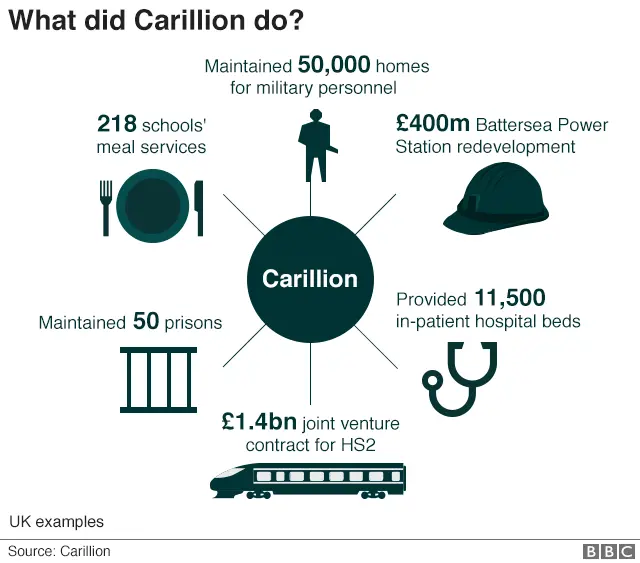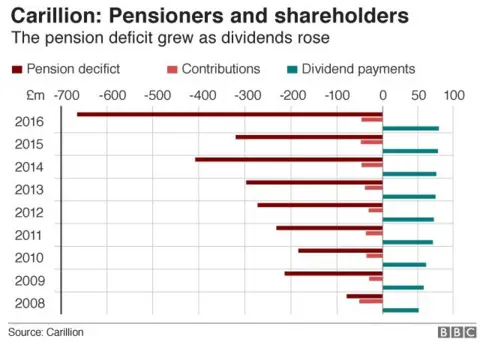Carillion tried to 'wriggle out' of pension contributions
 Reuters
ReutersCarillion "wriggled out" of payments into its company pension schemes as its troubles grew, while it carried on paying shareholder dividends and bosses' bonuses, say MPs.
The Work and Pensions Committee is questioning the way pension investments were managed at the collapsed outsourcing giant.
The schemes overall are in deficit.
But last year contributions to the pension funds were deferred until 2019, to help shore up the firm's finances.
The committee has published a letter from Robin Ellison, chairman of trustees of Carillion's pension scheme, giving an account of the last few years and suggesting they have been left with a funding shortfall of around £990m.
The letter shows that pension trustees were "kept in the dark" about the state of Carillion's finances until late last year, the committee argues, and that dividends and bonuses were paid out at the expense of pension fund contributions.
Investigation
On Monday, the Financial Reporting Council, the UK's accountancy watchdog, said it would launch an investigation into KPMG's audit of Carillion's financial results between 2014 and 2016 as well as the work it carried out during 2017.
The FRC said the probe would "consider whether the auditor has breached any relevant requirements, in particular the ethical and technical standards for auditors".
It will examine KPMG's audit work on areas including estimates and recognition of revenue on significant contracts and accounting for pensions.
KPMG said it believed that "we conducted our role as Carillion's auditor appropriately and responsibly", adding that it would co-operate fully with the FRC's investigation.
Contributions squeezed
Frank Field, chairman of the Work and Pensions Committee said: "It's clear that Carillion has been trying to wriggle out of its obligations to its pensioners for the last 10 years."
Mr Ellison will appear in person to answer questions from committee members later this week as pressure grows on those involved to explain why the pension funds' shortfall was allowed to widen sharply as the company's difficulties worsened.
Carillion, which manages a huge variety of public sector and private projects around the UK, from rebuilding Battersea Power Station to cleaning prisons, collapsed under a growing mountain of debt two weeks ago.

The firm was a conglomerate, incorporating parts of several previously independent firms including Tarmac, Wimpey, Mowlem and Alfred McAlpine. As a result its employees, past employees and pensioners are members of more than a dozen different pension schemes.
Mr Ellison, who oversees six of the firm's defined benefit pension schemes, said in his letter to MPs that the company repeatedly cited "constraints in cash flow" prior to 2017, as the reason they could not make higher pension contributions.
The letter states that after Carillion published its first profit warning in July, and its share price began to slide dramatically, the pension trustees engaged with Carillion "to understand what the profit warning meant for the schemes, and also began regular and close dialogue with the Pension Regulator."
In September 2017, the company requested that pension contributions be deferred altogether. Mr Ellison's letter explains the trustees agreed to a deferral, since that appeared to be a prerequisite for banks committing more funding for the troubled company.

Mr Field criticised the conduct of both the trustees and the regulator, pointing out that Carillion continued to pay out more than £70m in annual dividends.
However, there are no rules preventing companies from paying out dividends while running a pension deficit and company directors would argue that dividends are important in making a firm attractive to investors.
Carillion has also been criticised for the bonuses and severance pay it was paying to senior managers, although those were blocked following the firm's demise.
"The purported cash flow problems did of course not prevent them shelling out dividends and handsome pay packets for those at the top," said Mr Field.
"This culminated in negotiating deficit contributions away entirely last autumn to enable more borrowing.
"Remarkably, this was endorsed by the trustees and the Pensions Regulator.
Gamble
However, pensions expert Tom McPhail of Hargreaves Lansdown said the trustees should not be judged too harshly for agreeing the deferral.
"They had to make a judgement call whether to continue to work with the employer or effectively pull the plug and accept the consequences could be they would precipitate the collapse of the business," he said.
"That gamble did not pay off but they were doing what they thought was in the best interests of pension scheme members."
A spokesperson for the Pensions Regulator said it had been "working proactively" to protect pension member benefits for several years.
"The current regulatory framework attempts to balance the needs of a scheme and its members with the needs of an employer to invest in their ongoing business," the spokesperson said.
The Pensions Regulator said information available before July 2017 "did not highlight sufficient concern" to justify them stepping in.
A spokesperson for David Chapman, the official receiver, responsible for overseeing Carillion's liquidation process, said: "The official receiver will be investigating the actions of the directors of the company prior to liquidation, with regard to all the affairs of the company.
"If there was any inappropriate behaviour then he does have the ability to seek further action."
